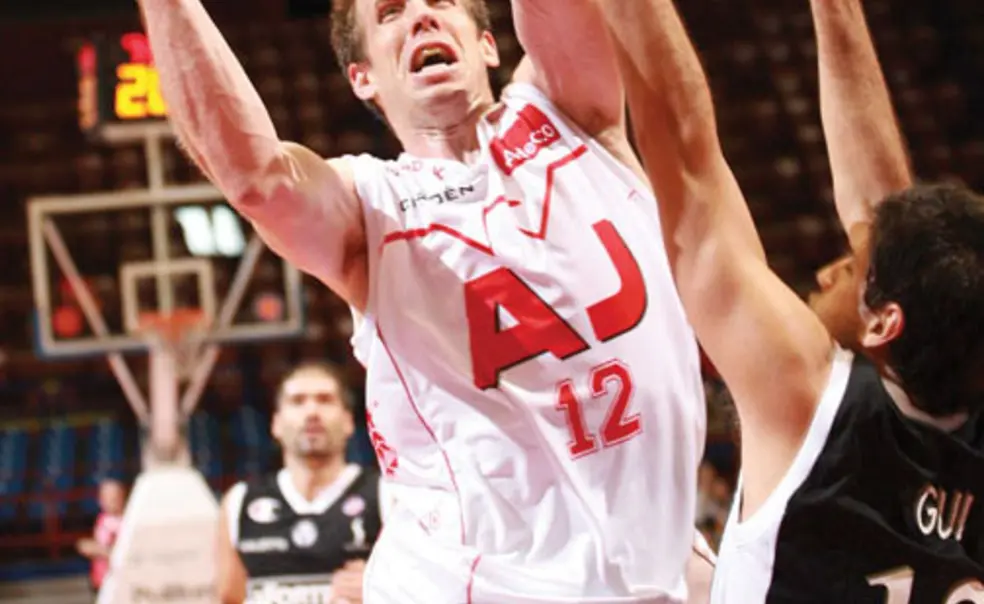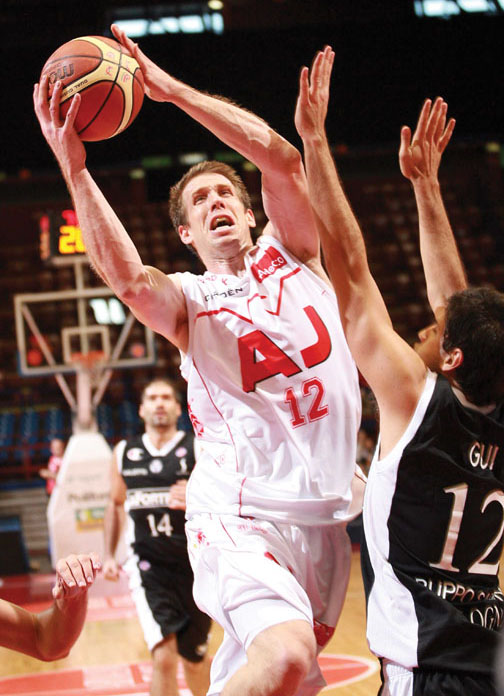Mason Rocca left Princeton in 2000 with a degree in electrical engineering and a profound sense of what might have been in his basketball career. Injuries, some of them serious, limited him all four years, and the moments on the court that he could savor were counter- balanced by stints rehabilitating a knee or nights spent watching the Tigers from the bench in street clothes.
Eight years later, Rocca still has to contend with injuries — being an undersized center (6 feet, 8 inches) with a hard-nosed approach to the game will do that. But he has flourished as a professional player in Italy, becoming one of the most respected post players on the continent. He also has enjoyed the personal journey, reclaiming his Italian heritage by immersing himself in the country’s language and culture. He’s even bought some land near Jesi, where he began playing in 2001, and cultivates 70 to 80 olive trees that produce “a very good olive oil,” he says with a note of pride.
“I really had no idea things would work out this way in Italy,” Rocca said after a November practice with his current team, Armani Jeans Milano. “Being over here has allowed me to finally show what I could do on the court, against some of the top players and teams in Europe, and also to learn about and appreciate my background. I feel extremely fortunate.”
Rocca’s success has surprised even his biggest fans. “[H]e’s a very single-minded guy,” says Bill Carmody, who coached Rocca for all four seasons at Princeton before moving to North-western. “He had it tough in college because of all the injuries, but his stick-to-it-iveness is amazing.”
Basketball in Italy has not been easy. Take the 2007–08 season, Rocca’s last of four with Naples. Rocca was beloved in the tough seaport town for his fearless style of play and for his ready embrace of things Italian, earning the affectionate nickname Il Sindaco (“the mayor”). The bad news? Rocca spent most of last season in pain, playing despite a serious knee injury, and the team had financial problems. Paychecks frequently were late, causing players to threaten a strike, and Rocca acknowledges the club still owed him money when he left for Milan last summer.
Rocca’s first month in Milan was problematic, too. His left knee still was slowing him, and a rash of injuries to teammates pushed the club toward the bottom of the standings in both the Italian league and in the Euroleague.
By December, though, Rocca was more upbeat. As injured players returned to the lineup, Milan won two Italian league games and two Euro-league contests, including the shocker of the young season — an 80–79 defeat of CSKA Moscow, the defending European champion.
“We were down about 20 at halftime, but we clawed back with our defense,” Rocca said of the Dec. 3 game. “There was a big celebration at the end. [Team owner Giorgio] Armani was there — it was a really cool atmosphere.”
Rocca’s scoring and rebounding stats are relatively modest, but he has built his reputation by setting emphatic picks and screens, boxing out taller opponents, and scrambling to win loose balls. And at least twice a game he’ll show off his trademark sweeping hook shot, a classic that he developed at Princeton under the tutelage of then-assistant coach John Thompson III ’88.
Rocca says his time at Princeton prepared him for European basketball. “It’s more team-oriented, more system-oriented over here,” he says. “A lot of American players have to adjust, but this was what I had known at Princeton. I was very used to sharing the ball.”
Similarly, he made a smooth adjustment off the court. Though of Italian-American background (a great-grand-father immigrated from Liguria), Rocca did not speak Italian while growing up, but once in the country he quickly became fluent. “I’ve got some pretty strong roots down here now,” he says. “Italy is definitely like a second home.”
Because of his heritage, Rocca holds an Italian passport and can play on the Italian national team. He was the starting center on the squad in the 2006 FIBA World Championships in Japan, where one of his memorable encounters came against 7-foot-6-inch Yao Ming of China (“a very, very large human being”). Yao played well, scoring 30 points, but Italy won by a comfortable margin.
Rocca, who says he’s honored to represent Italy, notes that he and his wife, Corinne, are determined that their three young children embrace both cultures. Their eldest, Sofia, who turned 4 in January, already has served notice that Italy is her kind of country.
“Sofia was speaking to me in Italian a few months ago, and I corrected her on some grammar,” Rocca says. “Then I thought about it, and I checked in a book upstairs. Sure enough, she was right — 3 years old, but she was right.
Tim Warren has written extensively about European basketball.













No responses yet